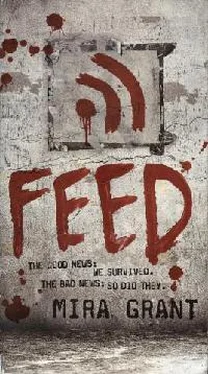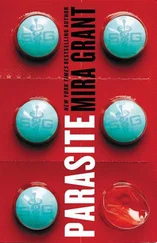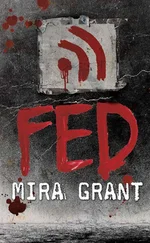My in-box finished loading. I began picking through the messages, moving with a speed that was half long practice and half the desire to get downstairs to dinner. Spam; misrouted critique of Buffy’s latest poem cycle, “Decay of the Human Soul: I through XII”; a threatened lawsuit if we didn’t stop uploading a picture of someone’s infected and shambling uncle—all the usual crap. I reached for my mouse, intending to minimize the program and get up, when a message toward the bottom of the screen caught my eye.
URGENT—PLEASE REPLY—YOU HAVE BEEN SELECTED.
I would have dismissed that as spam, except for the first word: urgent. People stopped flinging that word around like confetti after the Rising. Somehow, the potential for missing the message that zombies just ate your mom made offering to give people a bigger dick seem less important. Intrigued, I clicked the title.
I was still sitting there staring at the screen five minutes later when Shaun opened the door to my room and casually stepped inside. A flood of white light accompanied him, stinging my eyes. I barely flinched. “George, Mom says if you don’t get downstairs, she’ll… George?” There was a note of real concern in his voice as he took in my posture, my missing sunglasses, and the fact that I wasn’t dressed. “Is everything okay? Buffy’s okay, isn’t she?”
Wordless, I gestured to the screen. He stepped up behind me and fell silent, reading over my shoulder. Another five minutes passed before he said, in a careful, subdued tone, “Georgia, is that what I think it is?”
“Uh-huh.”
“They really… It’s not a joke?”
“That’s the federal seal. The registered letter should be here in the morning.” I turned to face him, grinning so broadly that it felt like I was going to pull something. “They picked our application. They picked us . We’re going to do it.
“We’re going to cover the presidential campaign.”
* * *
My profession owes a lot to Dr. Alexander Kellis, inventor of the misnamed “Kellis flu,” and Amanda Amberlee, the first individual successfully infected with the modified filovirus that researchers dubbed “Marburg Amberlee.” Before them, blogging was something people thought should be done by bored teenagers talking about how depressed they were. Some folks used it to report on politics and the news, but that application was widely viewed as reserved for conspiracy nuts and people whose opinions were too vitriolic for the mainstream. The blogosphere wasn’t threatening the traditional news media, not even as it started having a real place on the world stage. They thought of us as “quaint.” Then the zombies came, and everything changed.
The “real” media was bound by rules and regulations, while the bloggers were bound by nothing more than the speed of their typing. We were the first to report that people who’d been pronounced dead were getting up and noshing on their relatives. We were the ones who stood up and said “yes, there are zombies, and yes, they’re killing people” while the rest of the world was still buzzing about the amazing act of ecoterrorism that released a half-tested “cure for the common cold” into the atmosphere. We were giving tips on self-defense when everybody else was barely beginning to admit that there might be a problem.
The early network reports are preserved online, over the protests of the media conglomerates. They sue from time to time and get the reports taken down, but someone always puts them up again. We’re never going to forget how badly we were betrayed. People died in the streets while news anchors made jokes about people taking their zombie movies too seriously and showed footage they claimed depicted teenagers “horsing around” in latex and bad stage makeup. According to the time stamps on those reports, the first one aired the day Dr. Matras from the CDC violated national security to post details on the infection on his eleven-year-old daughter’s blog. Twenty-five years after the fact his words—simple, bleak, and unforgiving against their background of happy teddy bears—still send shivers down my spine. There was a war on, and the ones whose responsibility it was to inform us wouldn’t even admit that we were fighting it.
But some people knew and screamed everything they understood across the Internet. Yes, the dead were rising, said the bloggers; yes, they were attacking people; yes, it was a virus; and yes, there was a chance we might lose because by the time we understood what was going on, the whole damn world was infected. The moment Dr. Kellis’s cure hit the air, we had no choice but to fight.
We fought as hard as we could. That’s when the Wall began. Every blogger who died during the summer of ’14 is preserved there, from the politicos to the soccer moms. We’ve taken their last entries and collected them in one place, to honor them, and to remember what they paid for the truth. We still add people to the Wall. Someday, I’ll probably post Shaun’s name there, along with some lighthearted last entry that ends with “See you later.”
Every method of killing a zombie was tested somewhere. A lot of the time, the people who tested it died shortly afterward, but they posted their results first. We learned what worked, what to do, and what to watch for in the people around us. It was a grassroots revolution based on two simple precepts: survive however you could, and report back whatever you learned because it might keep somebody else alive. They say that everything you ever needed to know, you learned in kindergarten. What the world learned that summer was “share.”
Things were different when the dust cleared. Some people might find it petty to say “especially where the news was concerned,” but if you ask me, that’s where the real change happened. People didn’t trust regulated news anymore. They were confused and scared, and they turned to the bloggers, who might be unfiltered and full of shit, but were fast, prolific, and allowed you to triangulate on the truth. Get your news from six or nine sources and you can usually tell the bullshit from the reality. If that’s too much work, you can find a blogger who does your triangulation for you. You don’t have to worry about another zombie invasion going unreported because someone, somewhere, is putting it online.
The blogging community divided into its current branches within a few years of the Rising, reacting to swelling ranks and a changing society. You’ve got Newsies, who report fact as untainted by opinion as we can manage, and our cousins, the Stewarts, who report opinion informed by fact. The Irwins go out and harass danger to give the relatively housebound general populace a little thrill, while their more sedate counterparts, the Aunties, share stories of their lives, recipes, and other snippets to keep people happy and relaxed. And, of course, the Fictionals, who fill the online world with poetry, stories, and fantasy. They have a thousand branches, all with their own names and customs, none of them meaning a damn thing to anyone who isn’t a Fictional. We’re the all-purpose opiate of the new millennium: We report the news, we make the news, and we give you a way to escape when the news becomes too much to handle.
—From
Images May Disturb You , the blog of Georgia Mason, August 6, 2039
Presidential campaigns have traditionally been attended by “pet journalists” selected to follow the campaign and report on everything from the bright beginning to the sometimes-bitter end. The Rising didn’t change that. Candidates announce their runs for the big chair, pick up their little flock of television, radio, and print reporters, and hit the road.
This year’s presidential election is different, largely because one of the lead candidates, Senator Peter Ryman—born, raised, and elected in Wisconsin—is the first man to run for office who was under eighteen during the summer of ’14. He remembers the feeling of being betrayed by the news, of watching people die because they trusted the media to tell them the truth. So when he announced his candidacy, he made it a point that he wouldn’t just be inviting the usual crew to follow his campaign; he’d also invite a group of bloggers to walk the campaign trail with him from before the first primary all the way to the election, assuming he made it that far.
Читать дальше












